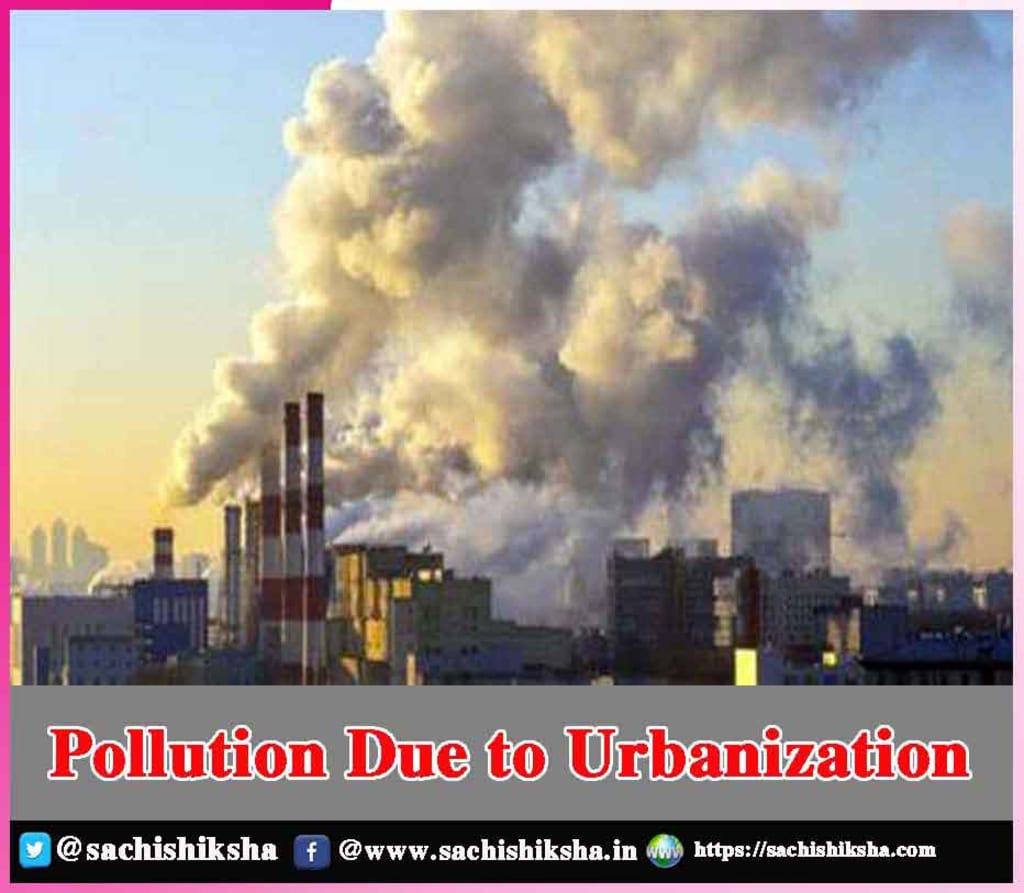Pollution due to Urbanization.
Understanding the impact of urban growth on the environment.
By NaveenkumarPublished about a year ago • 3 min read
Like
Share

- Urbanization, the process of creating and expanding urban areas, has been a defining characteristic of human civilization for centuries.
- As people migrate from rural areas to cities in search of better opportunities, urbanization continues to accelerate around the world.
- However, this rapid urban growth comes with its fair share of environmental consequences, one of which is pollution.
- Pollution due to urbanization is a complex issue that affects both the natural environment and human health.
- It results from a combination of factors, including increased traffic, industrialization, and population density.
- The effects of this pollution are widespread, from air and water pollution to soil contamination and noise pollution.
- One of the most visible and dangerous forms of pollution associated with urbanization is air pollution.
- Urban areas are often characterized by high levels of traffic, and the emissions from cars and trucks can have a significant impact on air quality.
- In addition to vehicle emissions, industrial processes and power generation can also contribute to air pollution in urban areas.
- The effects of air pollution can be profound, both for the environment and human health.
- High levels of air pollution can cause respiratory and cardiovascular problems, and in severe cases, can even lead to premature death.
- Air pollution can also have a detrimental impact on the environment, contributing to climate change and causing damage to ecosystems.
- Water pollution is another major consequence of urbanization.
- As cities grow, they often encroach on natural water sources, such as rivers and lakes.
- This can lead to increased levels of contamination in these bodies of water, as a result of sewage, industrial waste, and other pollutants.
- Water pollution can have a range of negative effects, from harming aquatic life to making water unsafe for human use.
- In addition, the contamination of water sources can have long-term impacts on ecosystems, disrupting the balance of the natural environment.
- Soil contamination is another issue associated with urbanization. As cities expand, they often cover large areas of previously undeveloped land.
- In some cases, this land may have been contaminated by industrial processes or other activities, leading to soil contamination.
- Soil contamination can have a range of negative effects, including reducing the fertility of the soil, harming crops, and posing a risk to human health.
- In some cases, contaminated soil may need to be remediated or removed, which can be expensive and time-consuming.
- Noise pollution is a less visible but still significant consequence of urbanization.
- As cities grow, they become noisier, as a result of increased traffic, construction, and other activities.
- This can have negative effects on human health, including stress, sleep disturbances, and hearing loss.
- The consequences of pollution due to urbanization are significant, but there are steps that can be taken to mitigate these effects.
- One approach is to improve public transportation infrastructure, which can reduce the number of cars on the road and therefore reduce air pollution.
- In addition, cities can take steps to encourage the use of bicycles and walking, which not only reduces air pollution but also promotes physical activity and improves public health.
- Cities can also invest in green spaces, such as parks and urban forests, which can help to mitigate the effects of air pollution and provide other environmental benefits.
- Another approach is to invest in sustainable urban design, which prioritizes the use of renewable energy, the conservation of natural resources, and the reduction of waste.
- This can help to reduce the environmental impact of urbanization and promote long-term sustainability.
- In conclusion, pollution due to urbanization is a complex and significant issue that affects both the natural environment and human health.
- Air pollution, water pollution, soil contamination, and noise pollution are all consequences of urbanization, and they can have serious negative effects.
- However, there are steps that can be taken to mitigate these effects, including investing in public transportation, promoting sustainable urban design, and creating green spaces. By taking a proactive approach to urbanization and prioritizing
About the Creator
Naveenkumar
"Crafting words, shaping stories"






Comments
There are no comments for this story
Be the first to respond and start the conversation.